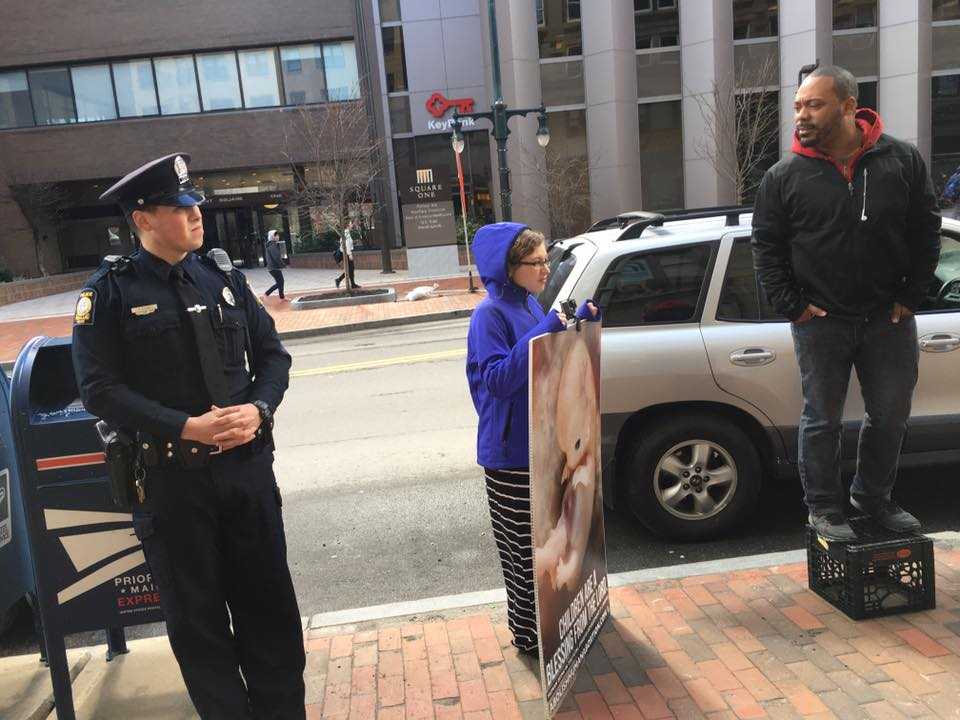
PORTLAND, Maine — A federal judge has granted a preliminary injunction to a Portland pastor who asserted that he was being unlawfully targeted by police outside of a Planned Parenthood facility for his pro-life preaching.
U.S. District Judge Nancy Torresen, appointed to the bench by Barack Obama, ruled on Monday that police may not use a noise ordinance in the Maine Civil Rights Act against Andrew March of Cell 53 Church and others who reach abortion-minded women in Monument Square.
“The case presents the difficult question of whether a state law providing protection to women seeking access to constitutionally protected health care violates the First Amendment rights of an individual who wishes to voice his opposition to abortion on a public sidewalk,” Torresen wrote. “I conclude that it does.”
Police had confronted March and others last year to advise that their voices could be heard by staff and clients inside of the Planned Parenthood facility, and told them to keep it down. But officers did nothing when those in favor of Planned Parenthood could likewise be heard inside of the building.
“Continued enforcement of a content-based restriction on speech would result in irreparable harm to the Plaintiff,” Torreson stated.
She said that there are other ways to keep order on the public sidewalk, as police “can further their interests of maintaining order and protecting individual patients through the criminal code, most obviously the disorderly conduct and harassment statutes.”
The Maine Civil Rights Act states that after receiving a warning, it is illegal for a person to intentionally interfere with a medical procedure at an abortion facility. Torreson found that the “intent to interfere” portion of the law would pertain to the content of the speech, and would therefore only relate to pro-life speech, which would therefore be an unconstitutional content-based restriction.
“While I understand the defendants’ frustration with the shifting sands of First Amendment jurisprudence, avenues are still open to protect the interests on both sides of this debate,” she wrote.
March had filed suit in November after Maine Attorney General Janet Mills, a pro-abortion Democrat, filed a civil rights lawsuit to keep Brian Ingalls, 26, from standing within 50 feet of the Planned Parenthood facility—or any Planned Parenthood location in Maine. Ingalls is an elder at March’s church.
Mills alleged in her lawsuit that Ingalls spoke too loudly on Oct. 23, 2015 about “murdering babies, aborted babies’ blood and Jesus” while preaching outside of Planned Parenthood to the point that his pro-life pleas could be heard in the room where examinations take place.
It is believed that Mills’ suit will likely be dismissed due to Torreson’s ruling.
“I think this is effectively the end of the state’s case against Mr. Ingalls,” attorney Stephen Whiting told the Bangor Daily News. “How can he be fined for violating a statute that [in essence] has been declared unconstitutional?”
However, a final ruling has yet to be issued in the case as the injunction was preliminary.
“The ruling is important in two immediately significant ways,” Kate Oliveri, an attorney with the Thomas More Law Center in Michigan, told the Portland Press Herald. “First, it means that Pastor March is likely to succeed on the merits when the case goes to summary judgment or trial. In other words, the court found, based on the evidence and legal arguments presented in the briefing and at oral argument, that the noise portion of the Maine Civil Rights Act is an unconstitutional restriction on free-speech rights.”
“Second, it means that Pastor March and other peaceful pro-life speakers can preach and pray on the public sidewalk without fear of prosecution under the noise portion of the Maine Civil Rights Act,” she said.
Timothy Feeley, a spokesman for the Maine attorney general’s office, said that an appeal of Torreson’s injunction is being considered.
“It is the attorney general’s responsibility to defend the constitutionality of state statutes whenever reasonably appropriate,” he told reporters. “The office continues to believe that this statute, carefully drafted and supported by diverse interest groups, is a reasonable accommodation of free speech.”
Become a Christian News Network Supporter...


